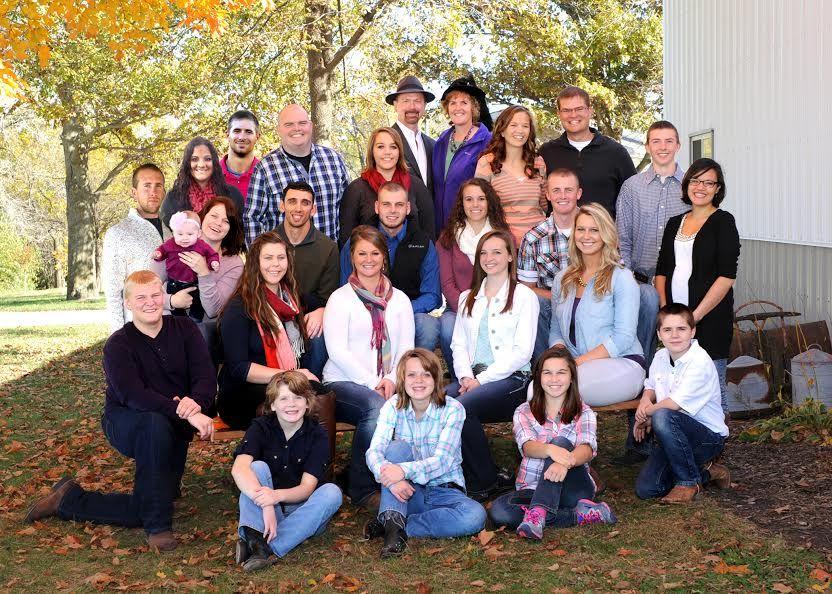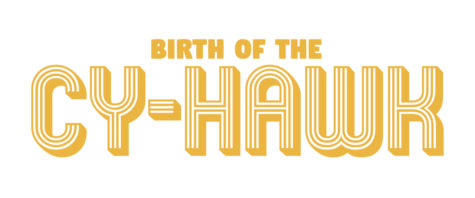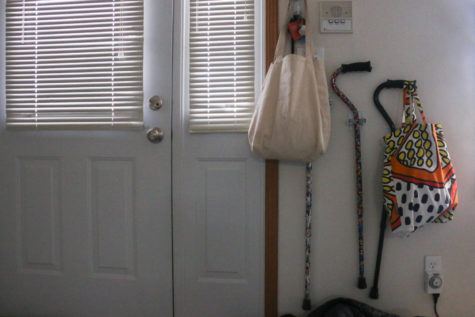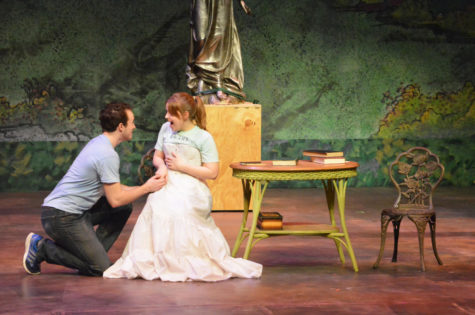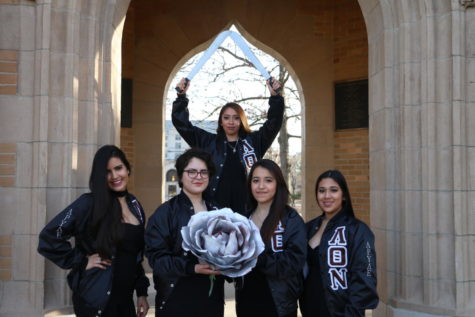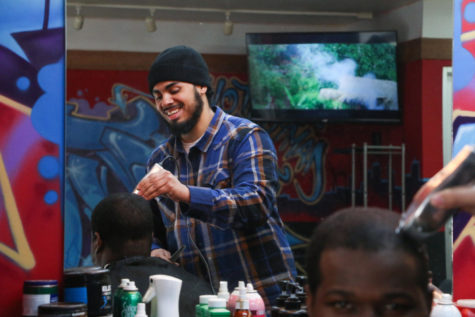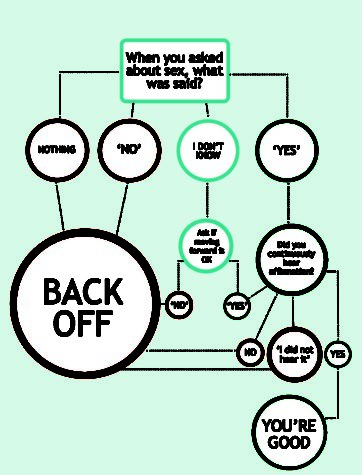Where the traffic stops
December 8, 2015
Ruth Buckels doesn’t tell her children she loves them very often, because, to some of her kids, love is a dangerous term.
The word love, Buckels says, could be a trigger to her foster kids whose previous guardians or biological family members told them, “I love you,” as a way to manipulate, abuse and even sell to a third party.
“They have to come to their own conclusion on what love is because most of my kids have been abused by the word love,” Buckels said. “I use, ‘I think you are incredible.’”
Buckels, 50, of Story City, started as a foster mom in 1988, and has since housed at least 90 teenaged foster children, in addition to raising four biological kids. Buckels was 23 at the time of her first placement. The first child placed with her was 13.
Flash forward to Nov. 14, when she officially adopted two more kids into the family, and she now has a combination of 19 adopted and biological kids, eight of whom currently live with her on her farm north of Ames.
Though Buckels loves all of her kids, one can’t go through 27 years of being a foster parent without a few bumps in the road.
Over her years of involvement in foster care, Buckels has had at least two teens swallow a handful of pills in an attempt to end their life, multiple who have tried to run away and some on whom she’s had to call the police. All of this occurred before she met any of the six who were at some point in their life trafficked into sex work. Of those six, five were sold to a third party by their own families, most of the time to pay bills.
“I don’t say, ‘I love you,’ because that could be a trigger for something one of their abusers or one of their traffickers said to them,” she said.
But her kids know she loves them. She shows them by believing in them.
“Most of these kids have never had someone believe in them,” Buckels said.
Buckels has worked at Youth and Shelter Services in Ames since 1988 and says she has a passion for teenagers.
“Every child needs a parent,” she said.
She has worked as a therapist, social worker, advocate, foster parent and now coordinator for Achieving Maximum Potential, or AMP, a youth foster support organization.
Our conversation about her work with AMP halted as we approached the Iowa state Capital building. She was asked to attend an invitation-only meeting hosted by Iowa Speaker Kraig Paulsen and Sen. Kevin Kinney to discuss what the state can do to better research human trafficking and offer aid to the crime’s victims.
—-
Buckels is a well-known name in the trafficking and youth advocacy communities.
Buckels hadn’t consciously thought about human trafficking, especially in Iowa, until she received a phone call from officials asking to speak with one of her foster children, Brittany Phillips, who they said was a main witness in a human trafficking case.
At age 14, Phillips was taken from her mother’s home in Des Moines – where her mother’s boyfriend sexually abused her – and moved to a treatment facility in Iowa City. She and a friend ran away from the facility and ended up in Cedar Rapids.
While looking for groceries at a Cedar Rapids Hy-Vee, a man offered Phillips a modeling job. She took the bait and was shipped to the sex trade in Chicago.
Phillips said she doesn’t quite remember what exactly happened the day Buckels discovered the teen’s past, or exactly how she was feeling, but she does remember worrying about Buckels loving her less.
“I remember being scared when I moved in that she’d find out and not want me,” Phillips said. “I was completely wrong. Her love for me didn’t become less. It only grew stronger.”
Finding out Phillips’ past sparked Buckels’ passion. She has traveled the state giving public presentations on the illegal sex trade in Iowa.
—-
Of the 40 or so in the Nov. 4 human trafficking roundtable discussion at the capital, at least 80 percent of the room knew Ruth Buckels. All asked how her kids were doing in school or sports. Some complimented her knit Iowa State Cyclone-colored hat. Buckels saw Kathy O’Keefe, director of Braking Traffik, from across the room.
“Ruth, how are you?” O’Keefe said as she leaned in for a friendly hug.
Buckels responded with a nod and a raspy, slightly-gurgled, “Just fine, thank you.”
“Oh, I just got over that cold crud last week,” O’Keefe said.
“No, this is from my chemo treatment,” Buckels corrected her.
“Oh, Ruth, I had no idea,” O’Keefe said.
Buckels proceeded to explain her recent discovery of breast cancer, the constant displeasure of the chemo treatments and the agony caused each week because of them.
But cancer couldn’t stop Buckels from going to this meeting, or working in general.
Buckels couldn’t miss this meeting in a room with some of the most influential people combating trafficking in the state of Iowa. She’d prayed for it for too long. Besides, it was Wednesday, one of her good days. Thursday was the best day of the week, so that’s the one day she goes into work.
“How are the kids taking it?” O’Keefe asks in regards to Buckels’ cancer.
“They’re terrified they’re going to lose their mom,” Buckels said.
The group of women chat for a bit, and just before the meeting starts, the group erupts in soft chortles in response to what Buckels had just said.
“Let me tell you, guys, I would not recommend taking chemo for fun.”
—-
Buckels was at a routine checkup at the beginning of summer 2015. When doctors told her they needed to look at her chest again, she didn’t fret too much. When they said they needed to run a biopsy, she started paying attention.
Nine millimeters of cancer was discovered near her armpit, she says, holding her hand to her face, her thumb and index finger so close together a fire ant would be snug. Those nine millimeters, she said, were dangerous. The cancer was removed from her body, but doctors still wanted her to go through chemotherapy to make sure all of the cells were dead.
Her prognosis is “good,” she says, but she still needs 12 rounds of chemotherapy every Friday until Dec. 18. After January 2016, she’ll take on 17 radiation treatments over five to six weeks.
Her first chemo treatment was the worst.
Buckels remembers suddenly being horizontal. She looked up to see a bright light, shielded by the figure of a stranger putting on plastic sanitary gloves.
The memory of the snaps is one that sticks out in her mind.
Snap, one glove on. Snap, the other.
“What is this man going to do to me?” she recalls of the thought racing through her mind.
She later discovered he was preparing to perform CPR.
Buckels’ first round of chemo, which was to last four hours, completely shut her throat. No air in, no air out. Nurses and doctors swarmed the room. Buckels felt as if she was watching it all happen to somebody else, until the thought dawned on her that all these people were coming for her.
“They’re coming for me,” she remembers thinking. “They are coming to save me.”
The unknown doctor didn’t have to perform CPR, but Buckels said a nurse told her they almost lost her. A conversation she doesn’t like to revisit.
Buckels’ mother, Helen Eley, of Zearing, also had breast cancer, a cloudy mass found in a mammogram. The mother and daughter had such different looking cancers that doctors said there was no way Buckels’ was genetic.
It still blows her mind.
—-
Eley remembers the day Buckels said she was going to help people. It was in the 8th grade and Buckels told Eley she wanted to help one of her classmates.
“I said no, he can do his own work,” Eley said. “She says, mom, he has so many troubles that aren’t school-related and those are what I’m going to help them with.”
Buckels was always a good student, Eley said. She talked a lot and sang a lot. She was in band, choir, school plays and the honor society. She did her chores on the farm and never let her mother down.
“If she was determined, she was going to do it and be good at it,” Eley said.
Eley thought this of her daughter through Buckels’ years of schooling for an associates in paralegal from Des Moines Area Community College and a bachelor’s and master’s from Iowa State. She thought like this when Buckels became a foster parent and active advocate on human trafficking education.
“She’s always well-received. She has a power of speaking. She stops talking, well look out,” Eley said, the last sentence with a soft chuckle.
Buckels didn’t tell Eley about the cancer until after the lump was removed.
“[The cancer] has slowed her a little bit, but not a lot,” Eley said. “She doesn’t say, ‘I’m not going to do this because I have cancer.’ She’s a strong person that way.”
—-
Buckels’ coworker and longtime friend Terri Bailey really wants to take Buckels to see the new movie, “Miss You Already,” featuring Drew Barrymore. There’s a scene shown in the trailer that reminds her of the two of them. Barrymore’s character finds out her best friend has an aggressive cancer. The two go wig shopping and laugh at the more ridiculous selections.
“It just looks like something we would do,” Bailey, also a foster parent and who has known Buckels since the early 1990s, said. “The movie looks hilarious and makes me think of Ruth. She’s very feisty and driven.”
Buckels has a wig, but hasn’t worn it yet, Bailey said. It rests on a stand on a table in the corner of Buckels’ bedroom, seemingly untouched. Buckels is now sporting a short, pixie haircut, and wears hats as long as she can stand the itch.
Buckels stays home as much as she can, Bailey said, as Buckels doesn’t want to be seen as weak. To Buckels, her voice, her hair, her reaction to food, all make her seem vulnerable, Bailey says of her decades-old friend.
“If you know her, she doesn’t want pity eyes,” Bailey said. “She has things to do and plans to make and we keep telling her to slow down and she goes, ‘No, no, no,’ and finally she said, ‘Man, I gotta slow down.’”
Her normal routine was up early, work late.
She can’t do that anymore, Bailey said. The chemo drains her energy.
“She’s fighting through these road bumps,” Bailey said. “That’s her strength – she pulls herself out.”
The way Buckels works is similar to the way she parents. Watchful, but distant enough to let everyone do their own thing, always encouraging.
“Whenever she sends out emails, she’ll say ‘I’m glad you’re all mine,’” Bailey said. “I would never want to do anything to disappoint her and that’s the way her kids are too. You don’t want to disappoint her because she’s too special.”
—-
Buckels is down to about an hour and a half for each chemo.
The worst days are Sunday through Tuesday. No food tastes the same and she never knows when she’s going to be able to keep down whatever she eats. Applesauce usually works. Sometimes oatmeal, but there’s always that taste of a tin can, liquid rust that lingers on her taste buds.
She is 100 percent nauseated, she said. Some days, she takes a bite and the food stays down. Others, she takes one bite and thinks, “why did I do that to myself?” With each morsel of food, she must consciously think about how quickly and when to eat it – a concept completely foreign to her.
She was always eating on the run. Grabbing a quick sandwich before jetting off to speak at a church or school about the terrifying truths of human trafficking in Iowa. Downing a granola bar before heading into a meeting for Achieving Maximum Potential. It’s never been, take these three bites and see if a half hour later the food will stay down. She can’t taste salt or garlic. She can’t find anything that tastes like it’s supposed to.
“But then I think, so many other people have it so much worse, I say to myself, ‘Shut up, Ruth. Shut up, Ruth,’” she said, her voice still raspy as it had been all day.
“But it’s weird for me.”
—-
Much like the way Ruth Buckels met most of her children, she met her current husband: through the foster care system.
Bill Buckels was already a foster parent, but wanted to continue his training, which Ruth was helping conduct. She was married to another man at the time, and didn’t think anything of her and Bill’s relationship other than that of one foster parent to another. Ruth at one point was Bill Buckels’ foster kids’ therapist, but the two still didn’t know each other too well.
Ruth married her first husband at the age of 19 and was married for 24 years, she quickly shares.
“I’m very private,” she says, and moves on.
After the end of Ruth’s first marriage, Bill Buckels checked in to see if she was OK.
“Well,” she responded. “You’re going to have to teach me how to be single.”
“I was good at that,” Bill Buckels said.
“I ended up teaching him how to be married,” Ruth Buckels laughs.
—-
The two moved in together on Bill Buckels’ farm around Christmas 2009 and wed in 2010.
The farm is home to not only the teenagers as well as Ruth and Bill, but also to four snakes, a tankful of fish, cows, cats and a dove. On top of the already-seemingly full zoo, the Buckels family also takes care of 14 dogs: German shepherds, corgis and St. Bernards, as Ruth has been in the dog breeding business for about three years. Ruth Buckels used to own horses and chickens, but couldn’t keep up with taking care of them while going through chemo.
It would be impossible to be bored at the Buckels’ house. Six bedrooms, an office and four bathrooms are necessary to house the double-digit family. The kids are two-to-four to a room. Bunkbeds are necessities. The spacious yard features a trampoline, hammock, picnic tables, a fire pit the size of a monster truck wheel and a homemade wedding deck for the kids to use if and when they get married. The kids like to play games outside in the open area on the farm, which is just north of Ames. Ghosts in the graveyard or capture the flag are some of the most popular.
In one basement hallway, a mattress rested against a wall.
“Someone must have gotten mad at someone,” Ruth Buckels chuckled. “They do that sort of stuff.”
In fact, they rat on each other all the time, both Buckels said.
“Oh, they sing like canaries,” Bill Buckels said.
But it’s always out of love, Ruth Buckels says.
An empty spot on the wall is impossible to find in the Buckels home. Pictures of each of the 19 kids, six of whom have significant others, cover nearly every inch of every room. That’s something she gives each kid, as most kids or teens in foster care won’t ever see their picture on any wall, Buckels said.
Trust is one of the hardest things for youth in foster care to learn.
“I’ve grown to completely trust her, whereas before I was skeptical. I gave my trust to people who were supposed to protect me and they didn’t,” Phillips said. “I see [Ruth] as my hero. She saved me. If I hadn’t been placed in her home, I wouldn’t be where I am today. She taught me that I’m worth so much more than anyone has ever told me. Someday I hope to be even half the women she is. I hope that I can save someone’s life like she did mine.”
That love, Buckels said, and that steady home, is the biggest gift she can give to any of her kids.

